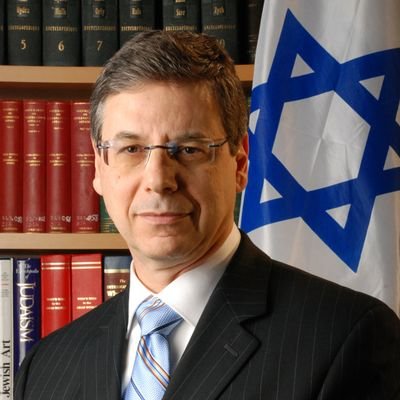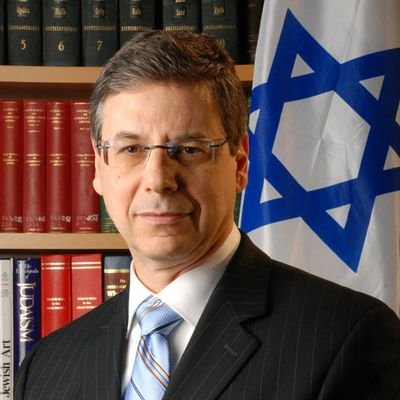
Former Ambassador Ayalon: The Peace Process was a Mistake
In a recent interview with Rabbi Pesach Wolicki on the Real America’s Voice network’s “Eyes on Israel” show, former Israeli Ambassador to the United States Danny Ayalon shared some critical lessons from his involvement in the Israeli-Palestinian peace process of the 1990s and early 2000s. Ayalon, who also served as deputy foreign minister and member of the Knesset, offered a candid reassessment of those negotiations, declaring them “a big mistake” and drawing parallels to the current debate surrounding the Two-State solution.

Danny Ayalon (Photo via Twitter)
Ayalon’s comments come as Israel is fighting a long war against Hamas and Hezbollah, following the brutal Hamas attack on October 7, 2023.
Reflecting on his participation in high-profile negotiations at Camp Wye and Camp David with then-Palestinian leader Yasser Arafat, Ayalon expressed regret over the entire process. “The whole process with Arafat and the Palestinians, down to today with Abu Mazen (Mahmoud Abbas), all of it was a mistake,” he stated emphatically.
The former ambassador explained that Israel entered these negotiations in good faith, firmly believing in their historical and religious connection to the land. “We believe strongly that the land of Israel has always been the land of the Jews, and that Jerusalem is our capital, established by David thousands of years ago,” Ayalon said. He explained that while there had been many invaders and a two-thousand-year exile, the Jewish people had always maintained a presence and ultimately returned, fulfilling biblical prophecies.
Ayalon pointed out that the negotiations began in the early 1990s, in the aftermath of the Cold War. The Clinton administration, he explained, believed they could reshape the Middle East and the world. This optimism led to pressure on Israeli leaders to engage in negotiations with the Palestinians. However, Ayalon emphasized that the initial understanding was that these talks would not lead to a Palestinian state, but perhaps to some form of autonomy without military capabilities.
“Even though it is our land, we were for peace and willing to make painful concessions,” Ayalon stated, highlighting Israel’s commitment to pursuing peace. However, he noted that this approach quickly proved misguided. “The Palestinians never thought of peace, they never wanted to build a Palestinian state,” he asserted.
One of the key issues Ayalon identified was the Palestinians’ reluctance to recognize Israel’s right to exist as a Jewish state. He described this as a fundamental lack of reciprocity in the diplomatic process. “Israel at that time recognized their right for self-determination. They never recognized the Jewish and Israeli right to self-determination,” Ayalon explained. This imbalance, he argued, should have been a red flag indicating the Palestinians’ true intentions.
Ayalon also pointed out what he called the “stage theory” employed by Palestinian negotiators. According to this strategy, the peace process was seen not as a path to coexistence but as a means to gradually weaken Israel.
“The [Palestinians] always talked in a derogatory way about the history of the Jews, trying to negate everything that our Bible says, both the [Hebrew] Bible and the New Testament. Most of all, they never wanted to sign an [agreement] that would put an end to all their false claims and end the conflict. They never wanted to sign [an agreement] that would end the conflict. This should have been a sign that, in their mind, the peace process was just to get a piece of the land and weaken Israel. This is what they called the ‘stage theory,’ in which [their plan] was to carve Israel up, piece by piece, until they destroy us altogether.”
The former ambassador expressed disappointment in Israel’s naivety during the negotiations. “We are peace-seeking people. Our first word is ‘Shalom’; this is how we greet people. Our God is a God of peace and our Bible is a Bible of peace,” he said. “We, I think wrongly, thought that just as we desire peace, so does the other side. And we were wrong.”
Drawing parallels between the failed peace process of the past and current diplomatic initiatives, Ayalon strongly criticized the push for a Two-State solution in the wake of recent events. “The Two-State solution is the wrong message, especially after the Hamas massacre on the 7th of October,” he stated firmly. “I don’t think this is viable politically or doable practically. Most of all, I think it is wrong morally, based on our values, our tradition and our history.”
Ayalon argued that promoting the Two-State solution at this juncture could have detrimental effects on Israel’s current military operations and international support. “[Pushing the two-state solution on Israel diminishes] American support in the war and prolongs the war. It gives oxygen to all the detractors of Israel and the United States in the region,” he warned.
The former diplomat also expressed concern about American pressure on Israel to provide humanitarian aid to Gaza or threats to withhold military support. Such actions, he contended, “prolong the war, which is against our interests and against American interests. This is misguided.”
Despite his criticism of past and current peace initiatives, Ayalon emphasized the importance of the U.S.-Israel relationship. “America and Israel have a natural alliance, regardless of who occupies the White House,” he stated. “It’s not a one-way street. America is Israel’s best friend and ally, but Israel also protects American interests in the Middle East, fighting against global terrorism.”
The former ambassador’s stance reflects a growing sentiment among Israeli officials and citizens who question the feasibility and desirability of a Two-State solution.
The post Former Ambassador Ayalon: The Peace Process was a Mistake appeared first on Israel365 News.
Israel in the News